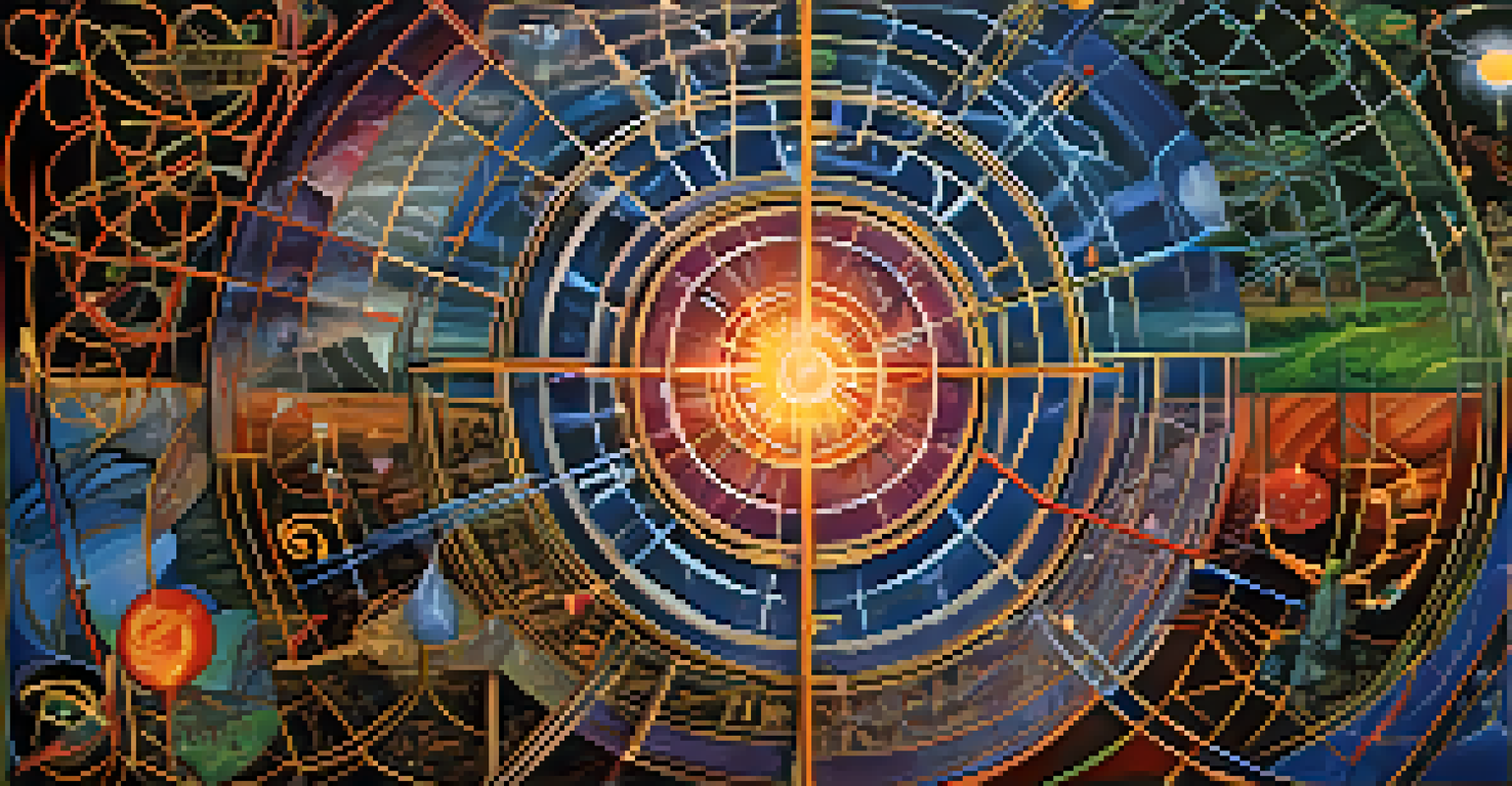Exploring Non-Linear Time in Eastern Spiritual Traditions

Understanding Non-Linear Time in Spiritual Contexts
Non-linear time is a fascinating concept often explored in various Eastern spiritual traditions. Unlike the Western perception of time as a straight line from past to future, non-linear time suggests a more cyclical or interconnected view. This perspective indicates that past, present, and future can coexist and influence each other, allowing for a deeper understanding of existence.
Time is a created thing. To say 'I don't have time,' is like saying, 'I don't want to.'
In many Eastern philosophies, such as Buddhism and Hinduism, time isn't just a sequence of moments. For instance, in Hindu cosmology, the universe goes through cycles of creation and destruction, known as Yugas, which illustrate this cyclical nature. This viewpoint encourages individuals to see life not as a series of isolated events but as part of a larger, interconnected tapestry.
By embracing non-linear time, practitioners can experience a sense of timelessness and unity with the cosmos. This shift in perspective allows for a richer spiritual experience and invites introspection about the nature of reality and our place within it.
The Role of Cycles in Eastern Spirituality
Cycles play a significant role in Eastern spiritual traditions, highlighting the importance of rhythms and phases in life. For instance, the seasons, lunar phases, and even life stages are seen as repeating cycles that influence human experience. This recognition of cyclical time helps followers align their lives with the natural world, fostering a sense of harmony and balance.

In Buddhism, the concept of Samsara refers to the cycle of birth, death, and rebirth. This cycle emphasizes the idea that life is an ongoing journey rather than a single linear path. By understanding Samsara, practitioners aim to break free from the cycle through enlightenment, thus transcending traditional time constraints.
Cyclical Nature of Time in Eastern Thought
Eastern spiritual traditions view time as cyclical rather than linear, emphasizing interconnectedness among past, present, and future.
Similarly, in Chinese philosophy, the concept of Yin and Yang illustrates the balance of opposites within cycles. These cycles reflect the belief that life is a continuous flow of change, where each phase is essential for the growth and evolution of the whole. This holistic view encourages mindfulness and acceptance of life's natural rhythms.
The Influence of Karma on Time Perception
Karma, a fundamental concept in many Eastern traditions, significantly shapes the understanding of time. It suggests that actions have consequences that can span across lifetimes, creating a web of cause and effect. This viewpoint encourages individuals to consider the long-term impact of their actions, fostering a sense of responsibility and mindfulness.
The future is already here – it's just not very evenly distributed.
In this context, time is not merely about the present moment but is deeply interwoven with one's past actions and future potentials. This interconnectedness can be both liberating and daunting, as it instills a deeper sense of purpose in every action taken. Practitioners learn to see their choices as part of a larger continuum, influencing their journey through time.
Ultimately, the concept of karma invites a more profound reflection on personal growth and spiritual development. It encourages individuals to engage in positive actions, knowing that they are contributing to their future experiences in this life and beyond.
Meditation and Non-Linear Time Experience
Meditation is a common practice in Eastern traditions that provides a unique gateway to experiencing non-linear time. During deep meditation, individuals often report a sense of timelessness, where past and future dissolve into a singular present moment. This experience can lead to profound insights and a greater understanding of the self and the universe.
The practice of mindfulness meditation, especially, emphasizes being fully present and aware in the moment. By focusing on the breath or sensations in the body, practitioners can step outside the constraints of linear time and tap into a more expansive awareness. This shift can reveal the interconnectedness of all things and the illusion of separateness.
Karma's Impact on Time Perception
The concept of karma illustrates how our actions influence not just our present but also our future experiences, creating a web of cause and effect.
Through regular meditation, many find that their perception of time transforms. Instead of feeling rushed or constrained by schedules, they begin to experience life more fluidly, appreciating the richness of each moment. This transformation not only enhances spiritual practice but also enriches everyday life.
Mythology and Non-Linear Time Narratives
Eastern mythologies often weave non-linear time concepts into their narratives, illustrating the cyclical nature of existence. For example, in Hindu mythology, stories of deities like Shiva emphasize creation, preservation, and destruction as part of a continuous cycle. These stories serve not only as entertainment but also as reflections of deeper truths about the universe and our place within it.
Similarly, in Chinese folklore, tales of immortals and their adventures often blur the lines between past and future. Characters may traverse different time periods, showcasing the fluidity of time and the idea that all moments are interconnected. These narratives invite listeners to ponder the nature of reality and the possibilities that lie beyond linear constraints.
By engaging with these myths, individuals can gain insights into their own life experiences and the cycles they encounter. This understanding can foster a richer appreciation for the lessons embedded in life's ups and downs, encouraging resilience and growth.
Philosophical Reflections on Time in Eastern Thought
Eastern philosophies offer a wealth of reflections on the nature of time, inviting individuals to contemplate their relationship with it. For instance, Laozi, the founder of Daoism, emphasized the importance of living in accordance with the natural flow of time, rather than resisting it. This perspective encourages a harmonious existence where one can adapt to the ever-changing nature of life.
In contrast, Buddhist teachings on impermanence highlight the transient nature of all things. By recognizing that everything is subject to change, practitioners learn to appreciate the present moment fully. This awareness can diminish attachment and foster a sense of peace, as one learns to navigate life's fluctuations with grace.
Mindfulness Enhances Time Awareness
Practices like meditation help individuals experience a sense of timelessness and interconnectedness, enriching both spiritual and daily life.
These philosophical insights encourage a shift in how we view time, urging us to embrace the present while understanding the interconnectedness of all moments. This holistic approach can lead to a more fulfilling and mindful life, where time becomes a tool for growth rather than a source of stress.
Integrating Non-Linear Time into Daily Life
Integrating the concept of non-linear time into daily life can profoundly impact one's overall well-being. Simple practices, such as mindfulness meditation or reflecting on personal cycles, can help individuals align with the natural flow of time. By doing so, they may find themselves more present and engaged in their experiences, reducing stress and enhancing joy.
Furthermore, embracing the idea that past experiences shape the present can encourage individuals to learn from their journeys. Instead of viewing mistakes as failures, they can be seen as essential parts of growth. This perspective fosters resilience and a deeper understanding of oneself, creating a more compassionate approach to personal development.

Ultimately, integrating non-linear time into daily life invites a more expansive view of existence. By recognizing the interconnectedness of all moments, individuals can cultivate a sense of peace and purpose, enriching their spiritual journey and everyday experiences.